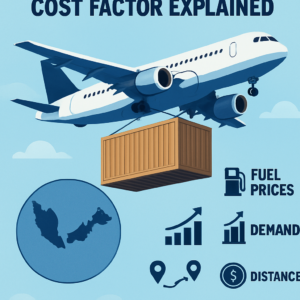Introduction
In the fast-paced world of logistics and supply chain management, selecting the right shipping coordinator is crucial to ensuring smooth operations and timely deliveries. A shipping coordinator plays a fundamental role in overseeing deliveries, managing schedules, and resolving logistical challenges. However, companies often encounter pitfalls in hiring and managing this role, leading to inefficiencies, increased costs, and missed deadlines.
In this article, we will explore five common pitfalls when selecting a shipping coordinator and provide actionable strategies to avoid them. By identifying these challenges early on and implementing effective solutions, businesses can improve their shipping efficiencies and enhance customer satisfaction.
Pitfall 1: Underestimating the Impact of Missed Deadlines
The Importance of Meeting Shipping Deadlines
In the logistics industry, time is money. Late shipments can disrupt supply chains, increase costs, and negatively impact customer relationships. According to a survey by Supply Chain Management Review, 89% of customers stated that on-time delivery significantly influences their purchasing decisions.
A missed deadline doesn’t just mean a late package—it can lead to a series of cascading problems, such as:
- Delayed production schedules for businesses dependent on raw materials.
- Increased operational costs due to expedited shipping fees or penalties.
- Loss of trust and credibility in the eyes of customers and partners.
For example, a major e-commerce company once lost millions in revenue during the holiday season due to late shipments. Their customers, expecting deliveries before Christmas, opted to cancel orders and switch to competitors offering faster shipping. This scenario highlights how essential it is to minimize delays in shipping.
How Shipping Coordinators Impact Delivery Times
A shipping coordinator is responsible for ensuring that all shipments move efficiently from suppliers to end customers. If they lack experience, organizational skills, or a thorough understanding of logistics, delays become inevitable. Poor communication, failure to track shipments, or ineffective transportation management can create bottlenecks and missed deadlines.
Pitfall 2: Failing to Mitigate Missed Deadlines
Key Causes of Missed Deadlines
Several factors contribute to missed deadlines in shipping, including:
- Poor Planning: Inadequate route planning, lack of contingency strategies, or inaccurate demand forecasts lead to delays.
- Poor Communication: Miscommunication between shipping coordinators, suppliers, and transportation providers may result in confusion and inefficiencies.
- Unreliable Carriers: Depending on carriers that have inconsistent service levels increases the risk of delays.
- Lack of Contingency Plans: Unexpected disruptions like weather, supplier issues, or customs delays require backup plans to keep operations on track.
Strategies to Prevent Missed Deadlines
To address these challenges, companies should:
- Use Automation & Tracking Tools: Implement real-time tracking systems like GPS logistics tracking software to monitor shipments and avoid last-minute surprises. Solutions like SAP Logistics Business Network or Oracle Transportation Management can improve efficiency.
- Enhance Communication Channels: Ensure seamless coordination between teams with automated status updates, daily meetings, and collaborative platforms.
- Opt for Reliable Carriers: Work with trustworthy delivery partners with a proven track record in timely service. Evaluating carrier performance reports helps companies choose dependable shipping vendors.
For instance, FedEx provides on-time performance data that businesses can analyze before committing to a partnership. Similarly, e-commerce platforms like Amazon Logistics use AI-powered forecasting models to prevent shipping bottlenecks.
Pitfall 3: Overlooking the Consequences of Missed Deadlines
Financial Penalties & Increased Costs
Late shipments come with financial repercussions. Businesses that fail to meet promised delivery dates may face:
- Chargebacks & Compensation Penalties: Retailers like Walmart and Amazon impose late delivery penalties, charging suppliers for delays.
- Increased Freight Costs: Expedited shipping to compensate for early delays results in higher transportation expenses.
- Damaged Inventory: For industries dealing with perishable goods, delayed shipments could lead to damaged products, causing financial losses.
For example, in the automobile industry, auto manufacturers rely on just-in-time (JIT) inventory models. If a car manufacturer fails to receive essential parts on schedule due to a shipping delay, assembly lines halt production, costing the company millions per day.
Customer Dissatisfaction & Reputation Damage
A delayed shipment can lead to customers losing confidence in a brand. Research by the Journal of Business Logistics reveals that 68% of customers are unlikely to do business with a company again if they experience delivery delays.
Impact on Supplier & Partner Relationships
Late deliveries affect more than just customers; they harm relationships with suppliers, distributors, and retailers. Repeated missed deadlines lead to:
- Strained Partnerships: Suppliers may deprioritize businesses known for frequent delays.
- Broken Contracts: Long-term agreements may be terminated if KPIs aren’t met.
- Loss of Market Share: Consistent delays can push customers toward competitors offering better shipping reliability.
Pitfall 4: Not Implementing Strategies to Avoid Missed Deadlines
Establishing Clear KPIs for Shipping Coordinators
Companies should set up clear Key Performance Indicators (KPIs) for shipping coordinators, ensuring accountability and efficiency. Some essential KPIs include:
- On-Time Delivery Rate (OTD): Measures how often shipments arrive on schedule.
- Freight Cost per Shipment: Tracks logistics expenses and identifies cost-reduction opportunities.
- Supply Chain Cycle Time: Evaluates how long it takes for shipments to move from origin to destination.
Investing in Training Programs
A well-trained shipping coordinator is equipped to navigate unexpected logistics challenges. Businesses should provide training in:
- Supply Chain Management Best Practices
- Freight Documentation & Compliance
- Technology Tools for Logistics & Inventory Management
Pitfall 5: Poor Communication Across Logistics Teams
Why Communication is Critical in Shipping Coordination
Effective communication between suppliers, transport carriers, warehouse teams, and customers ensures shipping operations run smoothly.
Best Practices for Effective Communication in Logistics
- Daily Coordination Meetings: A quick 5-minute huddle between the shipping team and warehouse staff can ensure alignment.
- Cloud-Based Collaboration Tools: Software like Slack or Microsoft Teams allows real-time updates on shipments.
- Escalation Protocols for Urgent Issues: Establishing an emergency response framework ensures problems are addressed immediately.
Conclusion: Making the Right Choice in Hiring a Shipping Coordinator
By implementing proactive measures, investing in technology, and fostering accountability, businesses can enhance efficiency, reduce logistics costs, and satisfy customers with timely deliveries.
“`




